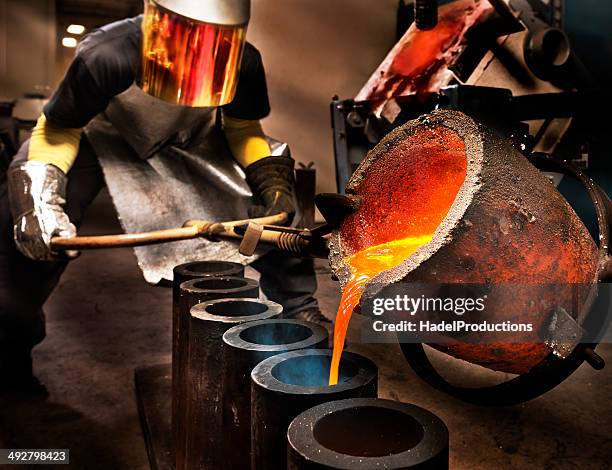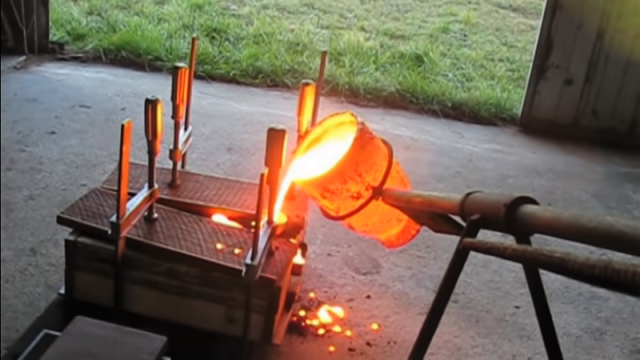A Comprehensive Guide to Metal Casting: Advantages and Solutions Supplied by Foundries
Metal casting is a critical process in different markets, providing various advantages through the services of foundries. These facilities change liquified metal into exact and long lasting parts, accommodating certain customer needs. By employing advanced technologies, factories guarantee quality and efficiency in production. The complexities of metal casting and the varied techniques included elevate essential inquiries regarding its duty in modern-day production. What technologies exist in advance in this essential field?
Recognizing the Metal Casting Process
The metal casting process is a basic method used in making to create complex shapes and elements. This approach entails pouring liquified metal right into a mold and mildew created to develop the desired object. The procedure starts with pattern production, which works as a template for the mold and mildew. Aluminum Foundry. Numerous products, such as sand, metal, or ceramic, are utilized for mold-making, relying on the certain requirements of the casting
As soon as the mold is ready, liquified metal is put right into it and enabled to strengthen and cool. After solidification, the mold and mildew is removed, exposing the cast component. Numerous techniques, consisting of sand casting, investment casting, and pass away casting, are employed, each suited to various applications and products. Quality assurance measures, such as examinations and screening, are necessary to assure the final item meets specs. Generally, the metal casting process plays an essential role in producing parts for markets ranging from vehicle to aerospace.
Trick Advantages of Metal Casting
Metal casting supplies substantial benefits that make it a favored production approach in various industries. Its layout versatility and precision permit detailed shapes, while affordable automation improves performance. In addition, the convenience and toughness of materials used in casting add to the toughness of the end products.
Design Versatility and Accuracy
Releasing amazing style flexibility and accuracy, metal casting permits developers and designers to produce detailed shapes and functions that would be tough or impossible to accomplish with various other manufacturing approaches. This capability enables the manufacturing of complicated geometries, internal frameworks, and great information that boost item capability and looks. Additionally, various casting methods, such as sand casting, financial investment casting, and pass away casting, offer further alternatives for personalization, suiting varied material buildings and task demands. The flexibility of mold and mildews permits modifications during the style phase, improving the shift from idea to last item. Eventually, metal casting stands apart for its capability to supply high-precision parts, making it an invaluable procedure in sectors varying from auto to aerospace and past.
Cost-efficient Automation
Affordable mass manufacturing stands as one of the key benefits of metal casting, enabling producers to produce huge quantities of elements at a reduced cost each. This performance develops from the capacity to develop detailed molds that can be reused several times, significantly lowering configuration and operational expenses. Furthermore, metal casting procedures, such as sand casting and die casting, permit high throughput, making it practical to meet the needs of large production runs. The lowered product waste and power usage additionally enhance cost savings, making metal casting an attractive alternative for markets requiring mass components. Generally, the economical nature of metal casting settings it as a favored method for manufacturers intending for economic effectiveness in their production processes.
Product Flexibility and Strength
One of the standout characteristics of metal casting is its impressive product versatility, which allows for using a vast array of metals and alloys. This versatility enables manufacturers to pick materials that best fit their specific applications, from aluminum and bronze to iron and steel. Each metal offers special properties, including varying levels of strength, rust resistance, and thermal conductivity. Consequently, metal casting can produce parts that fulfill rigid efficiency needs across varied markets, such as automobile, aerospace, and construction. Furthermore, the stamina of actors metals can be boosted through various treatment processes, making sure longevity and long life. Aluminum Casting. On the whole, the combination of material convenience and inherent stamina makes metal casting a favored choice for generating premium elements
Sorts Of Metal Casting Methods
Metal casting incorporates a range of strategies that accommodate various manufacturing demands and material properties. Typical methods consist of sand casting, which utilizes a sand mold and mildew for intricate shapes, and financial investment casting, understood for its precision and surface finish. Die casting is an additional strategy that uses high-pressure shot of molten metal into molds, ideal for automation of little parts.
Shell molding supplies a much faster different, using a resin-coated sand to produce thin-walled molds, while shed foam casting allows for complex styles without the need for a core.
Additionally, continuous casting is made use of for generating long areas of metal, such as bars or sheets, by solidifying molten metal in a constant process. Each method is and offers special benefits selected based on variables like the required detail, production volume, and product kind, making sure exceptional outcomes in metal manufacture throughout different industries.
The Function of Foundries in Metal Casting
Factories play a crucial function in the metal casting procedure, offering as the facilities where molten metal is transformed right into finished products. These specialized facilities are outfitted with the required tools and modern technologies to manage various steels, ensuring high-quality outcomes. Foundries are accountable for numerous essential functions, including melting the metal, pouring it right into molds, and enabling it to solidify.
In addition, they maintain rigorous safety and environmental standards to shield employees and reduce eco-friendly influence. Proficient service technicians and engineers team up to optimize casting processes, enhancing effectiveness and minimizing waste. Shops likewise engage in quality control measures, ensuring that the last items satisfy certain resistances and requirements. This quality control is necessary for industries that rely on specific elements, such as auto and aerospace. Consequently, factories contribute considerably to the general production landscape, enabling innovation and development throughout different fields.
Personalized Metal Casting Providers
Personalized metal casting services provide customized design services that fulfill details client needs. These services likewise give material option proficiency, making certain the right metal is selected for the desired application. Such adaptability and knowledge enhance the total top quality and efficiency of the end product.

Customized Design Solutions
Customized design options in metal casting supply makers with the adaptability to produce components that satisfy specific performance and visual needs. Foundries use tailored services that permit customers to define dimensions, forms, and surface coatings to achieve desired end results. This personalization procedure usually includes partnership between designers and designers, guaranteeing that the end products straighten with functional demands and industry standards. Advanced innovations, such as computer-aided design (CAD) and simulation software, enable precise modeling and screening of parts before production, minimizing mistakes and enhancing effectiveness. By leveraging tailored design solutions, businesses can enhance performance while minimizing waste and prices, inevitably bring about a more affordable edge in the market. This flexibility is crucial for markets requiring special applications and specifications.
Material Selection Proficiency
When choosing products for metal casting, know-how plays a crucial function in making certain that the appropriate option aligns with both performance requirements and cost-effectiveness. Foundries utilize proficient professionals who comprehend the residential or commercial properties of numerous metals and alloys, permitting them to suggest perfect products for particular applications. Elements such as stamina, rust resistance, and thermal conductivity are carefully considered to meet the client's requirements. In addition, sector patterns and website advancements in material scientific research notify these decisions, enabling shops to remain competitive. By leveraging their expertise, foundries can aid customers in steering via complicated material alternatives, eventually resulting in improved item quality and minimized manufacturing costs. This customized understanding is important for attaining successful outcomes in custom-made metal casting services.
Top Quality Control in Metal Casting
Quality control in metal casting is crucial to assure that the final items meet the called for specs and performance requirements. Foundries utilize a variety of methods and methodologies to guarantee the best quality of actors components. This procedure starts with rigid product assessments, verifying that resources follow sector criteria. Throughout the casting process, real-time tracking and screening are conducted to examine criteria such as temperature, mold honesty, and dimensional accuracy.

Applications of Metal Castings Throughout Industries
Metal spreadings play an important duty in numerous markets, offering as the foundation for countless applications. In the automotive field, cast elements such as engine blocks and transmission real estates are needed for vehicle efficiency and reliability. The aerospace industry counts on precision spreadings for important components that assure safety and effectiveness in flight. In addition, the building sector uses metal castings for fixtures, fittings, and structural elements, enhancing the sturdiness of buildings and facilities.
The energy sector advantages from spreadings utilized in wind turbine blades and other tools crucial for power generation. The clinical area likewise uses metal castings in tools and tools, demonstrating the convenience of this production process. In general, metal castings are indispensable to the capability and advancement of diverse markets, showcasing their value in modern-day technology and facilities advancement
Often Asked Inquiries
What Products Are Generally Used in Metal Casting?
Common materials utilized in metal casting include aluminum, iron, steel, brass, and bronze. Each material provides special residential or commercial properties appropriate for different applications, allowing producers to pick the ideal option based upon strength, weight, and deterioration resistance.
Just how Long Does the Metal Casting Refine Commonly Take?
The metal casting procedure typically takes a number of hours to a few days, depending upon aspects such as the complexity of the layout, sort of metal used, and the details casting approach utilized by the foundry.
What Is the Ecological Effect of Metal Casting?
The environmental influence of metal casting consists of energy consumption, exhausts, and waste generation. Factories frequently implement actions to mitigate these results, such as reusing materials and making use of cleaner innovations to reduce their eco-friendly footprint.
Can Metal Casting Be Provided For Small-Scale Projects?
Metal casting can undoubtedly be carried out for small jobs. Numerous factories deal with such requirements, offering tailored services that suit restricted manufacturing runs while preserving top quality and precision in the last products.
What Are the Precaution in Metal Casting Foundries?
In metal casting shops, security actions include individual protective devices, correct ventilation, training on tools use, emergency treatments, regular upkeep checks, and adherence to sector safety criteria to minimize dangers linked with molten metal and harmful products.
Additionally, metal casting processes, such as sand casting and pass away casting, permit for high throughput, making it possible to satisfy the needs of massive production runs. One of the standout characteristics of metal casting is its remarkable product adaptability, which enables for the use of a vast array of alloys and metals. In addition, constant casting is utilized for generating lengthy sections of metal, such as sheets or bars, by strengthening molten metal in a continual procedure. Shops play a critical function in the metal casting process, offering as the centers where liquified metal is changed into finished products. Typical materials made use of in metal casting include light weight aluminum, iron, brass, bronze, and steel.